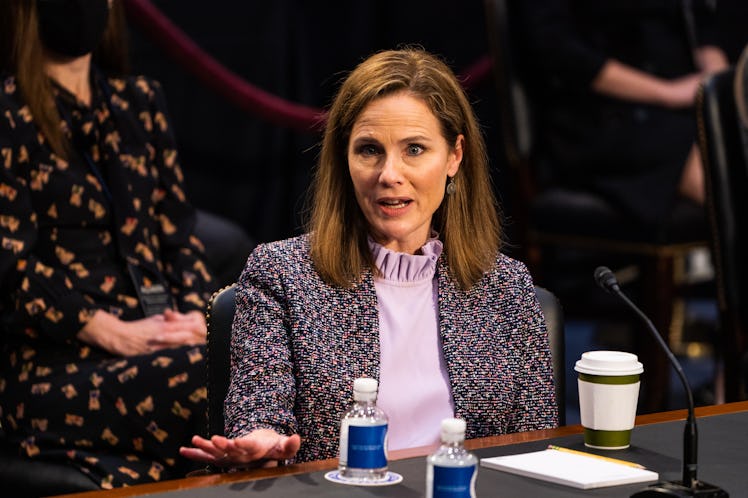
People Are Furious About Amy Coney Barrett's Confirmation Vote For This Reason
The makeup of the Supreme Court has officially changed for the third time in four years. On Oct. 26, exactly one month after her official nomination, Amy Coney Barrett was confirmed to the Supreme Court of the United States, filling the seat vacated by the Sept. 18 death of progressive icon Ruth Bader Ginsburg. It may have been more or less a foregone conclusion, but that doesn’t mean people have to be happy about it. These tweets about Amy Coney Barrett’s Supreme Court confirmation are calling this move out for its wild timing.
Barrett, who previously sat on the U.S. 7th Circuit Court of Appeals, was confirmed in a 52-48 vote, mostly along party lines. Sen. Susan Collins of Maine, who is in the middle of a tense re-election fight, was the only Republican to vote no. Barrett is expected to be sworn in at the White House later on Oct. 26. According to The New York Times, Justice Clarence Thomas, another conservative on the Supreme Court, is expected to administer the oath of office. Her Monday evening swearing-in means that Barrett could begin work at the Supreme Court as early as Tuesday, Oct. 27.
Barrett’s 30-day confirmation process is astonishingly fast, compared to the average 70 days it usually takes to appoint a new Supreme Court nominee. Trump nominated Barrett on Sept. 26, and Republicans indicated they intended to confirm her before the election.
Barrett’s nomination was controversial from the start. When Ginsburg died less than two months before the Nov. 3 presidential election, Democrats were quick to say a replacement should not be named before a new president was elected. It was essentially the same argument Republicans made four years ago, when conservative Justice Antonin Scalia died nine months before the 2016 election. That year, Republicans successfully blocked President Barack Obama’s nominee, Merrick Garland, for nearly a year, arguing that the American public should be able to weigh in on the selection of a new justice via their vote for president. President Donald Trump later appointed Justice Neil Gorsuch to the court after his 2017 inauguration. But following Ginsburg’s death, Republicans backtracked on their previous stance, with Senate Majority Leader Mitch McConnell saying it had only applied to situations where different parties controlled the White House and the Senate.
However, a lot of people weren't buying that this year — particularly given that due to the ongoing coronavirus pandemic, millions of Americans have already voted and weighed in on the Trump presidency. Some states with early voting have been accepting ballots since mid-September. According to The Washington Post, as of Oct. 26 more than 62 million Americans have already cast their ballots via early or mail-in voting, 133% of the total tally of early voters in 2016.
Combine those election votes with her hasty push through the confirmation process, and a lot of people were calling Barrett's confirmation hypocritical.
Other people quickly began focusing on how a future president, or Congress, could nullify the outcome, including impeaching Barrett or adding more justices to the Supreme Court.
Barrett is controversial in her own right — a conservative Catholic and constitutional originalist, she has written disparagingly of abortion rights and suggested lawmakers can make judgements in according with their religion. Many progressives are deeply concerned that her addition to the court will threaten abortion rights case Roe v. Wade, access to health care, and LGBTQ+ rights.
Barrett is also the third Supreme Court justice Trump has appointed in his one term, following Gorsuch in 2017 and Justice Brett Kavanaugh in 2018. His rate of nominations far outpaces other recent presidents — Presidents Barack Obama, George W. Bush, and Bill Clinton, all two-term presidents, each appointed two justices during their eight years in office. Notably, her confirmation shifts the court to a solid six-to-three conservative majority, solidifying right wing control of the bench for a generation. While justices traditionally do not indicate how they will rule on specific issues or cases before their confirmation, a conservative Supreme Court majority will have a lasting impact on everything from what cases are heard to the rulings — and dissents — are handed down.